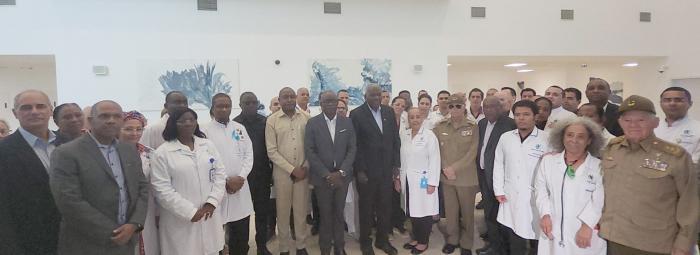
Cabinda, Angola.– "The imperialists were unable to take Cabinda and suffered a crushing defeat there," said the historic leader of the Cuban Revolution, Fidel Castro Ruz, at the ceremony held in the Primeiro de Maio Square in Luanda on March 27, 1977.
In those years, the situation was very difficult for the brotherly Angolan people: while South African racists advanced from the south, mercenaries and troops from Zaire were just a few kilometers from Luanda, and mercenary troops supported by the regular army of Zaire were preparing to attack Cabinda, according to the plans of imperialism.
The intention was to take Cabinda—an important Angolan enclave due to its strategic position and natural resources—and, in collaboration with the fascists of South Africa, occupy the entire territory of Angola, thus thwarting the proclamation of national independence of this brother African country, scheduled for November 11, 1975.
But, as Commander-in-Chief Fidel Castro pointed out, the imperialists and foreign invaders "made a mistake: they did not count on the people of Angola, they did not count on the MPLA, they did not count on the FAPLA. And they did not count on international solidarity (...). And on November 11, when the thunder of artillery could still be heard in Luanda, comrade Agostinho Neto, after so many sacrifices and so much struggle, was finally able to proclaim Angola's independence." In essence, Cabinda was "heroically defended by MPLA fighters with a handful of Cuban instructors," as Fidel stated.
Half a century after that epic victory by Angolans and Cubans, Esteban Lazo Hernández, member of the Political Bureau, president of the National Assembly of People's Power and of the Council of State, arrived in this Angolan province, accompanied by the delegation from the largest of the Antilles participating in the celebrations for the 50th anniversary of the national independence of the brotherly African country, as well as in the main activities marking the 50th anniversary of the establishment of diplomatic relations between Cuba and Angola.
Upon arrival at the airport Maria Mambo Café, Lazo Hernández was received by the Cabinda Vice Governor for Technical Services and Infrastructure, Juliano Capita, and later held a fraternal meeting with authorities from this territory at the headquarters of the Cabinda Provincial Government.
The Deputy Governor conveyed warm greetings to the President of the National Assembly of the provincial governor, Suzana Fernanda Pemba Massiala de Abreu, while the head of the Cuban Parliament highlighted the historical closeness between Cabinda and Cuba, a sign of the deep brotherhood between our peoples.
At the same time, he shared information about the current situation in the country, characterized by the recovery process in the wake of the damage caused by Hurricane Melissa and the confrontation with the consequences of the blockade imposed by the U.S. government.
He then toured areas where the historic battle of Cabinda took place. Here, Angolan officials recognized Cuba's heroic internationalist contribution to their nation.
"This moment represents not only a tribute to the memory of the heroes who fell in the struggle for national sovereignty, but also an opportunity to share experiences, strengthen discipline, professionalism, and mutual appreciation of the military principles that unite our peoples," said Miguel Casimiro Mádia Kanga, brigadier of this Angolan military unit.
For his part, Hero of the Republic of Cuba, Major General Ramón Pardo Guerra, highlighted the importance of this battle as part of the struggle for Angola's national independence and territorial integrity, as well as the legacy of Army Corps General Ramón Espinosa Martín.
Esteban Lazo's visit continued at the Cabinda General Hospital, where he held an emotional meeting with a delegation of more than 40 Cuban health workers who are supporting the people of this African nation.
Five decades after the proclamation of Angola's national independence and the heroic battle of Cabinda, this province continues to be a symbol of brotherhood between two peoples, geographically distant but united in the common struggle against colonialism, apartheid, and imperialism; for independence, freedom, and national sovereignty.








